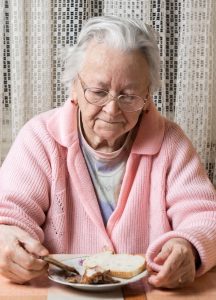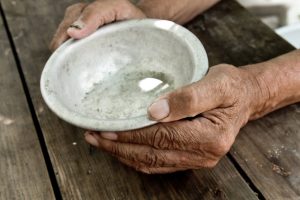Malnutrition in Nursing Homes
 Nursing homes exist to give our loved ones the medical care they can’t get at home. These facilities are also supposed to supply residents with necessities, social interaction, and proper nutrition, everything a person needs to stay healthy and happy. When a nursing home resident displays signs of malnutrition, something is significantly wrong. Unfortunately, nursing home abuse or neglect may be to blame.
Nursing homes exist to give our loved ones the medical care they can’t get at home. These facilities are also supposed to supply residents with necessities, social interaction, and proper nutrition, everything a person needs to stay healthy and happy. When a nursing home resident displays signs of malnutrition, something is significantly wrong. Unfortunately, nursing home abuse or neglect may be to blame.
Addressing the basic nutritional needs of nursing home residents should be a given for nursing homes. So how do nursing home residents end up underfed, underweight, and ill? The answer may be abuse or neglect on the part of the nursing home or its staff. One study indicates almost 20 percent of nursing home residents suffer some form of malnutrition.
If you have concerns about the health of your loved one, contact the Augusta nursing home abuse and neglect attorneys of Chris Hudson Law Group today by calling (706) 863-6600. We take concerns about abuse, neglect, and malnutrition very seriously.
Our team will always take the time to listen to your story and brainstorm ways we may be able to help you and your family. Victims of neglect and abuse might be owed financial compensation, and negligent nursing homes and caregivers could be held accountable. If you would like to get in touch with someone from our team to discuss your case, you can fill out this contact form and someone from our office will contact you soon.
What Is Malnutrition?
Malnutrition is a medical condition that develops over time when the body is deprived of crucial vitamins and minerals. The body requires fuel in the form of food to function and maintain healthy tissue and organs. When individuals become undernourished or even overnourished, they can suffer from malnutrition.
Undernutrition occurs when a person is not given enough food containing essential nutrients. Undernutrition can also happen when nutrients are consumed but are excreted more rapidly than the body can process them. Overnutrition happens when people eat too much or they eat the wrong types of foods, causing a dietary imbalance.
Signs and Symptoms of Malnutrition
 As we age, our digestive systems don’t always function the same way they did in our youth. Older adults need the correct balance of vitamins, minerals, fiber, and other essential nutrients to stay healthy. When the body lacks these vital nutrients, bodily functions can begin to deteriorate. Some of the most common symptoms of malnutrition include:
As we age, our digestive systems don’t always function the same way they did in our youth. Older adults need the correct balance of vitamins, minerals, fiber, and other essential nutrients to stay healthy. When the body lacks these vital nutrients, bodily functions can begin to deteriorate. Some of the most common symptoms of malnutrition include:
- Pale skin
- Thick or dry skin
- Bruising easily
- Skin rashes or irritation
- Thinning of the hair
- Hair that falls out easily
- Aching joints
- Fatigue
- Weakness
- Soft or brittle bones
- Bleeding gums
- Dental problems
- Night blindness
- Chronic illnesses or infections
- Bloating of the abdominal tissue
- Diminishing sense of taste and smell
- Weight loss
If you notice a change in your loved one’s appearance or other unusual symptoms, talk to your loved one and their physician. Providing a family member with snacks or pumping them full of calories may cause further problems. Let a medical professional diagnose and treat signs of malnutrition so your loved one gets the correct balance of nutrients without overloading their system.
Complications from Malnutrition
Malnutrition can cause acute signs and symptoms that may be reversed. However, prolonged or untreated malnutrition can result in significant health complications. Every system in the body requires nutrients to function. Take away the fuel, and detrimental health effects will soon follow. Complications that can arise from malnutrition can include:
- Tooth loss
- Weakened immune system
- Frail bones that break easily
- Slower wound healing
- Cognitive impairment
- Death
Malnutrition is a serious medical condition that requires medical intervention. Encourage your loved one to seek medical help if you suspect malnutrition or talk to your family member’s doctor.
How Nursing Home Abuse and Neglect Can Cause Malnutrition
Many nursing home residents don’t have access to their own food or meals. Residents depend on the nursing home and its staff to provide meals and offer healthy food choices. Although malnutrition can happen when a resident refuses to eat or has a significant health concern, malnutrition can also be a sign of abuse or neglect.
In some cases, malnutrition in nursing home residents can be attributed to neglect. Neglect is a form of abuse. It is characterized by a pattern of failures to meet the needs of an elderly resident. There are different forms of neglect, but malnutrition is commonly a sign of the neglect of basic needs. Food and hydration are some of our most basic needs as human beings. When a caregiver engages in a systematic pattern of intentionally or accidentally forgetting to feed a resident, that may be considered neglect. Neglect is generally the most direct path to malnutrition in a nursing home or long-term care facility.
It is easy to see how neglect may result in malnutrition. However, neglect isn’t the only form of abuse that can cause this disorder. Psychological abuse could also potentially contribute to malnutrition in an elderly nursing home resident. Psychological or emotional abuse occurs when a caregiver verbally assaults a resident or uses threats to instill fear. Harassment, name-calling, and humiliation are common emotional abuse tactics. However, threatening to withhold food if a resident doesn’t “behave” can be considered emotional abuse. Calling a resident fat, ugly, or shaming their body, could also trigger an eating disorder or result in a resident refusing food. These manipulation strategies can eventually lead to malnutrition.
Physical and sexual abuse in nursing homes may also contribute to malnutrition. These forms of abuse can sometimes cause depression and anxiety. These mood disorders can change a person’s eating habits and may eventually result in signs of malnutrition.
Contact an Experienced Nursing Home Abuse and Neglect Attorney Now
At Chris Hudson Law Group, we know you can’t bear the thought of watching your loved one waste away. Our legal team wants to help you get your loved one out of a bad situation and pursue the compensation they deserve.
If you suspect abuse or neglect or have noticed signs of malnutrition in your family member, contact our office at (706) 863-6600. We will sit down with you for free to discuss your concerns and advise you about how we may be able to help.
Don’t let an abusive situation go on any longer. Hold negligent nursing homes and caregivers accountable, and call Chris Hudson Law Group today.
